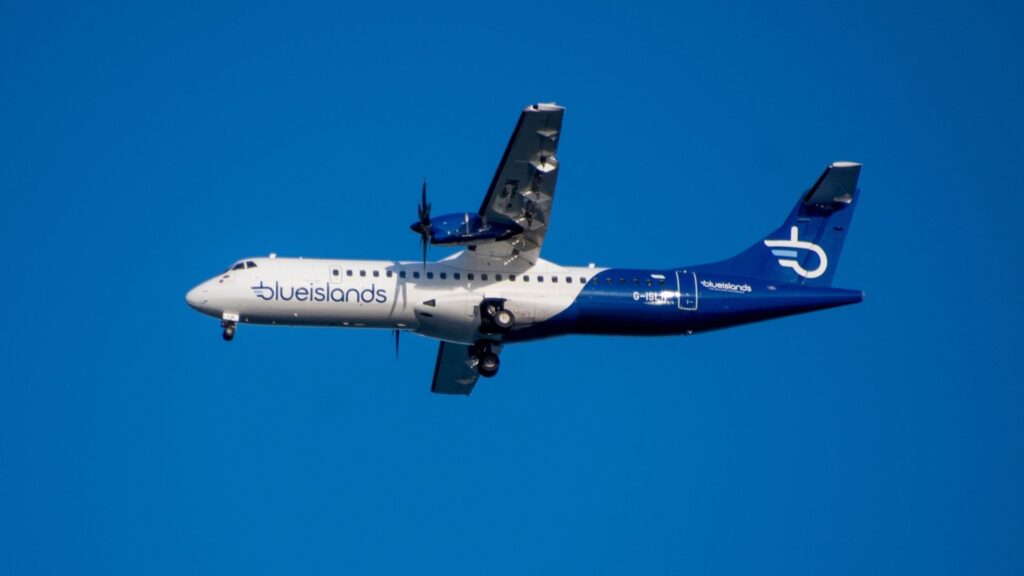
Blue Islands, a regional airline based in Jersey and Guernsey, has suspended all operations effective immediately after nearly 26 years of service. The decision, announced on November 14, 2025, follows the Government of Jersey’s inability to provide necessary funding for low-demand routes, leaving thousands of passengers with disrupted travel plans.
The airline, which operates ATR 72 aircraft, has grounded its fleet and canceled all flights, impacting connections from the Channel Islands to cities including Bristol, Exeter, East Midlands, and Southampton. This suspension is particularly significant as it follows the recent collapse of another UK regional carrier, Eastern Airways, underscoring the vulnerabilities within the United Kingdom’s regional airline sector.
Operational Details and Immediate Effects
In a statement released late on the same day, Blue Islands instructed passengers to refrain from traveling to the airport and advised seeking refunds through credit card providers or travel agents. The airline, which has been in operation since 1999 and rebranded as Blue Islands in 2006, was managing a small fleet of five aircraft operating on six scheduled routes.
The management of Blue Islands indicated that discussions with the Government of Jersey had concluded without the prospect of additional financial support. This left the airline in a position where it could not sustain operations and prompted an urgent evaluation of potential restructuring or sale to another operator, according to a report by Aviation Week.
Impact on the UK Air Travel Market
The suspension of Blue Islands will remove approximately 9,200 weekly seats from the UK airline schedules, leading to the cancellation of around 136 flights per month between the UK and the Channel Islands. This reduction in capacity is particularly detrimental to the niche market, where profit margins are already thin.
Routes such as Jersey to Exeter and Guernsey to Southampton are challenging for larger low-cost or network carriers to serve profitably, meaning the sudden loss of Blue Islands’ capacity raises concerns about connectivity and fare increases for local residents and businesses. The void left by Blue Islands may lead to heightened dependence on remaining operators like Aurigny, easyJet, Loganair, and British Airways, potentially requiring schedule adjustments to accommodate the increased demand.
While there may be opportunities for new market entrants, establishing a viable service is likely to take considerable time and effort.
Guidance for Affected Passengers
Passengers with existing bookings on Blue Islands should avoid the airport unless they have alternative travel arrangements. With the airline halting operations, no staff will be present at check-in or customer service desks. Customers are encouraged to pursue refunds through their credit or debit card providers, utilizing chargebacks or other consumer protection measures where applicable.
Additionally, travelers can request refunds from travel agents if their tickets were part of a package deal. The Civil Aviation Authority (CAA) is expected to provide guidance for those affected, advising passengers to rely on official channels for information.
Travel insurance policies that include coverage for scheduled airline failure may assist some customers in recouping costs. Passengers are advised to retain receipts for any replacement flights, hotels, or ground transportation, and to seek reimbursement from banks or other service providers. Those requiring urgent travel between the Channel Islands and the UK mainland should act quickly to secure seats on remaining carriers, as available capacity is anticipated to tighten further in the wake of Blue Islands’ suspension.
The collapse of Blue Islands, following the exits of Eastern Airways and Flybe from the market, highlights the structural fragility of the UK’s regional airline ecosystem, characterized by high fixed costs, volatile demand, and limited government support. The discussion surrounding the need for more robust funding for peripheral air services is likely to intensify in the coming months as stakeholders assess the future of regional connectivity.






